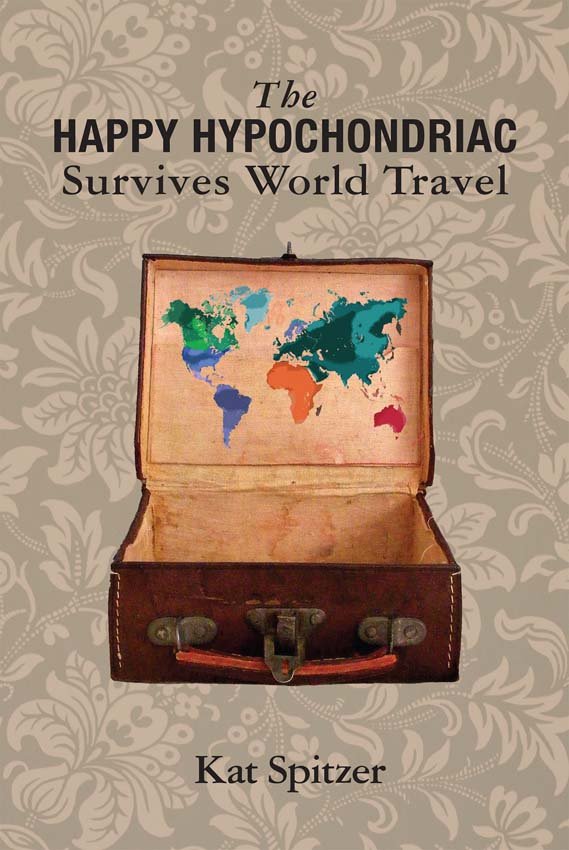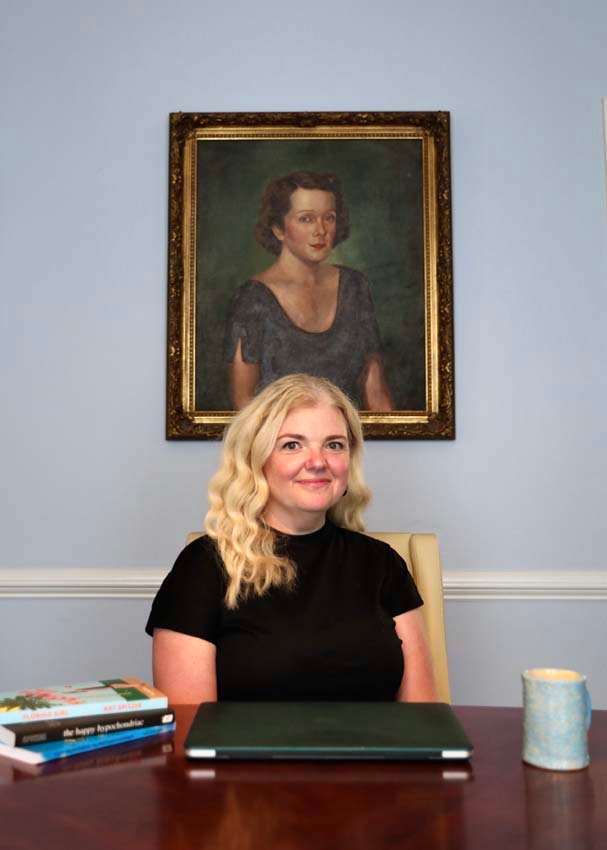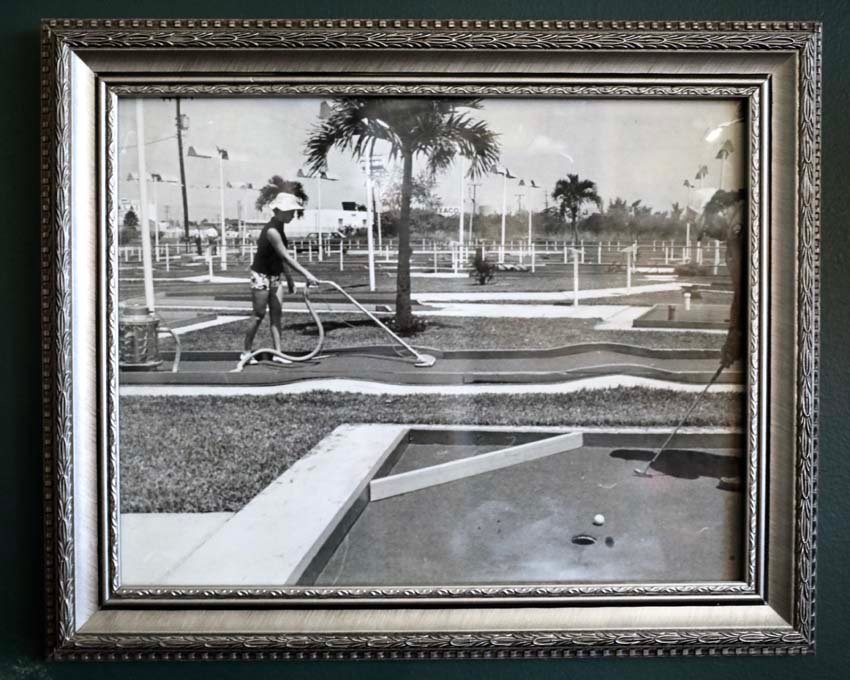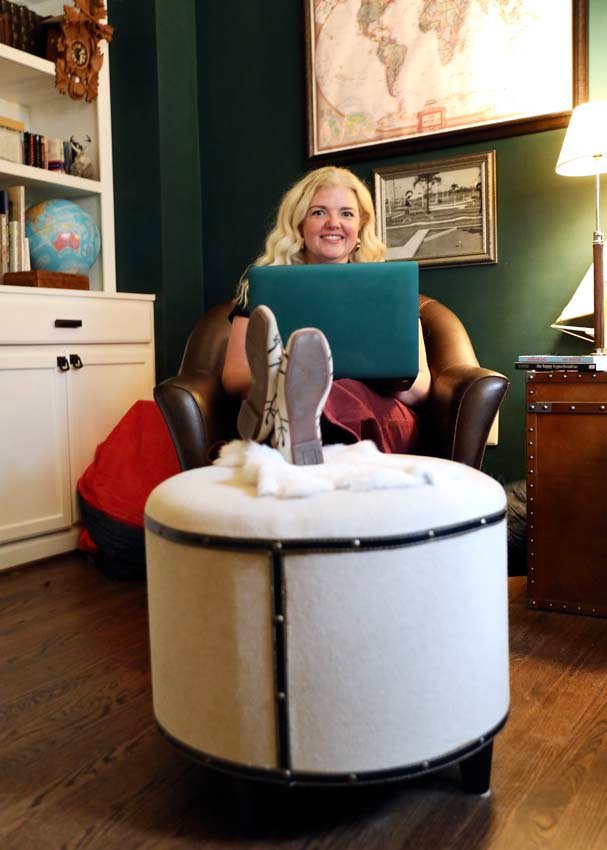+ By MacDuff Perkins + Photos by Kat Spitzer
Annapolitan Kat Spitzer, author of the humorous books The Happy Hypochondriac and The Happy Hypochondriac Survives World Travel, has cultivated a life from the confines of mental health struggles. Spitzer’s experiences with anxiety have not defined her but instead have opened a door to creative expression.
Born in Miami, Florida, to parents who owned a mini golf course, Spitzer grew up in an entertainment-oriented place. “There was an incredible cast of characters, between employees and customers,” she says. A creative writer at a young age, she kept a running notebook with her as a child, profiling friends and family and writing what she now calls “terrible poetry.”
She felt a heightened sense of unease as a child, but apparently those feelings were perceived as normal in her family. “I think my mother had undiagnosed obsessive-compulsive disorder,” she says. Spitzer believes that she may have learned anxiety behaviors from her mother. Also, her mother had specific fears (such as a fear of travel) that she coped with by focusing on the mini golf business and her family. Studies have shown that mental health conditions have an environmental aspect to them and that children whose parents suffer from anxiety are up to seven times more likely to develop an anxiety disorder themselves.
When she was a teenager, Spitzer’s own fears began manifesting in curious ways. She became highly cautious of anything related to germs. The slightest rash would trigger a fear in her that she had developed a debilitating disease. A bee sting or the crash after a caffeine high could send her into full collapse. Her parents would have an argument, and that would trigger an asthma-like attack in her chest.
Finding a doctor to help her with these issues was a challenge. A therapist in her college’s health department advised Spitzer to go back to journaling, a practice that had brought her joy earlier in life, as a way to deal with her anxiety. And it helped. Slowly, day by day, Spitzer began to chronicle her journey as an anxiety-filled hypochondriac. “The best writing happens when you’re noticing the little details in the world around you,” she says.
Spitzer’s writing began to expand, past her journal’s pages. She got a gig writing movie reviews for local newspapers and later started submitting short, humorous pieces to Reader’s Digest. “I’d get very excited that those . . . were published,” she says.
After Spitzer graduated from Vanderbilt University, her mother died suddenly and unexpectedly. As she grieved, she began to understand the role that her mother’s mental health played throughout her mother’s life. All the pieces began to come together as she reflected on her mother’s anxiety—how she couldn’t drive on the highway, forcing the family to take back roads instead; how her mouth would go dry and her hands would sweat; and how the family avoided air travel. This posed a conflicting challenge for Spitzer, who always had a sense of wanderlust and imagined what was out there in the world.
That fall, Spitzer went to the University of Vermont to study law. There, it became clear to her that she wanted to have more control in her life. She began going to a doctor for regular checkups. She started practicing yoga and meditation, and she watched her diet. “You can become paralyzed, or you can change the trajectory of your life,” she says.
This change of course put Spitzer on an airplane headed to Greece two years after her mother’s death. “I needed to push myself so far out of my comfort zone that I had to break a wall,” she says, thinking of the heart flutters she experienced on the flight.
After graduating from law school, Spitzer returned to Vanderbilt University to work in development and fundraising. Her nonprofit work led her to the American Institute for Cancer Research. She got married and began a successful career as an attorney and consultant. Shortly afterward, she became pregnant with her son. But after a lifetime of fearing hypochondriacal issues, Spitzer was suddenly faced with a very real health scare. “I had a heart issue develop during my pregnancy,” she says, “and there was a very real concern that I might lose my baby.”
Her husband suggested that Spitzer go back to journaling. This time, her venue was online. She would write late at night, after her family was asleep. Her blog, The Happy Hypochondriac, began attracting an audience of similar sufferers. People reached out to her from around the world. After a lifetime of isolation, she found it healing.
Several years later, Loyola University Press picked up Spitzer’s blog and turned it into her book, also titled The Happy Hypochondriac. Soon, there was a follow-up. And recently, Florida Girl was published. It’s an absurdly fun, fictitious retelling of her life growing up on a mini golf course in the Sunshine State.
“Journaling helped me keep details together,” she says. “But when I write characters, I get into their heads and that makes me feel less unique in a sense.” Spitzer speaks to the comfort that those who experience mental health challenges often find in knowing that they are not alone in their struggles.
For those who know Spitzer and her prior writings, Florida Girl, though fictional, could be seen as a canvas on which her journals were used to present her family’s life. One scene details how her parents would prioritize their work ethics over others: “While other families go to church on Sunday morning, my family opens up our place for business,” she writes. “I guess that makes us heathens. Our limited access to the holy spirit may also explain our gluttonous behavior because we Jarvises are very lax about our physical well-being. Since elementary school, I’ve had a nightly bedtime of around midnight and eaten out for almost every meal.”
Today, with two young adult children, Spitzer is aware of how her own anxiety can affect her family. But she now holds the tools to break some generational patterns. Her son often travels out of the country, and her 16-year-old daughter recently traveled to Indonesia. “This is not something I ever would have imagined,” she says, “and if my mother were alive, she would be blown away.”
For more information,
visit katspitzer.com.










